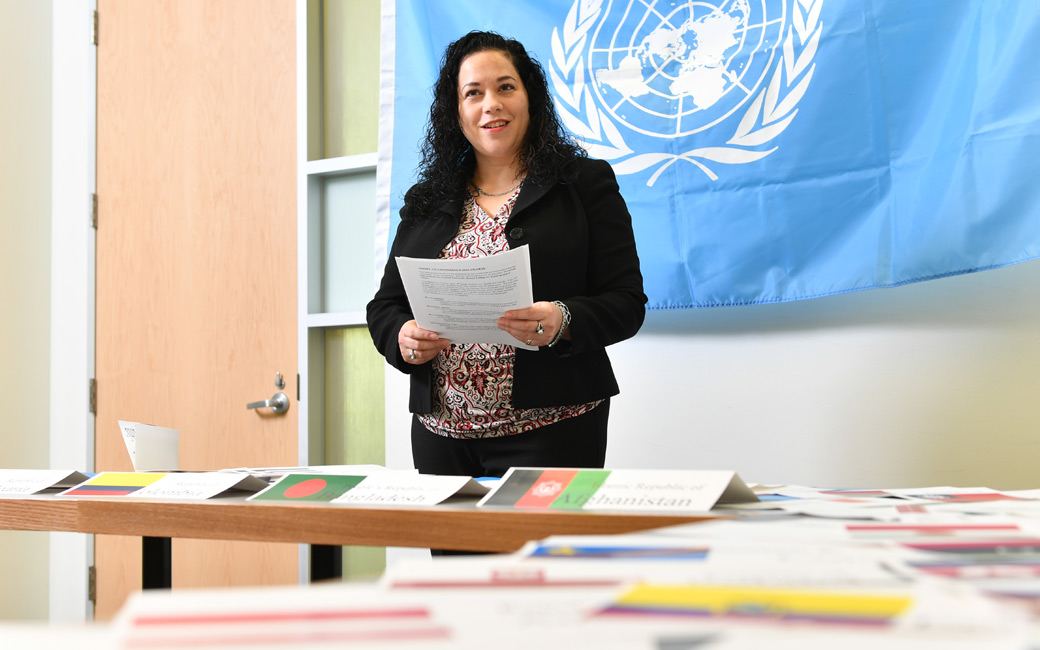Model UN moves online, continues to create global opportunities
TU’s annual conference for local high schoolers to take place on Zoom
By Cody Boteler on March 4, 2021

For nearly two decades, the Model United Nations Conference at Towson University has brought hundreds of Baltimore County Public School (BCPS) students together to discuss global issues, problem-solve and participate in engaging political simulations.
Normally a weekend of in-person discussions with volunteers carrying messages between high school “delegates,” the event this year will be entirely online because of the COVID-19 pandemic.
Between March 5–6, hundreds of BCPS students will, with guidance from TU student and alumni volunteers, split into pods of 25–35 and discuss global issues, focused this year on inequality.
Alison McCartney, a professor in the Department of Political Science and faculty director of the Honors College, started TU’s Model U.N. in 2002. She says the conference helps prepare students for college, so it was an easy call to continue this year, even if it had to move online.
“It’s mostly sophomores participating. That’s a crucial year for catching kids and giving them direction for college,” McCartney says.
Maddie Meyer, a junior Honors College student majoring in international studies with minors in German and political science, helped shift the conference online and instruct student volunteers.
Last year, Meyer took a course in civic engagement with McCartney. Part of that course is working with BCPS students to prepare them for the Model U.N. Conference in March.
“It’s so rewarding to put in the work of helping the students grow, helping them develop their research and communication skills and then seeing it put into action in the conference,” she says.
The keynote speaker is Tom Dowling ‘06, an economist at the International Monetary Fund who has worked on projects and programs in the United States, Canada, Barbados and Denmark, among others. He was one of the first students to help with the conference when he was an undergraduate, McCartney says.
Moving online opens new opportunities for volunteers, too. More 36 alumni and dozens of TU students are helping with the conference—some from as far away as China, the United Kingdom and Malaysia—who could not be involved if the event occurred in-person.
One of the alumni volunteers is Sarah Rowan ’19. She says she first participated in the conference as a class requirement and ended up hooked.
“It’s become a routine for me: It’s going to happen every year, and I expect to do it every year,” Rowan says. “It keeps me connected with the university and with all my friends in the political science program.”
Another addition to the online model will be career interest breakout sessions. After a quick awards ceremony on the second day, BCPS students will go into breakout rooms, led by the alumni volunteers, to learn more about potential career fields.
Hundreds of BCPS students have chosen to enroll at TU after participating in the Model U.N. Conference, McCartney says. The participants are exposed to global topics they might not encounter in a classroom and gain valuable experience along the way.
“The students learn lots of teamwork skills. They work on developing their interpersonal skills. They learn how to debate civilly, listen to different points of view and work with others in a constructive way to reach their goals,” McCartney says.
Jonathan Peang, a teacher at Milford Mill High School who has been bringing students to the conference for four years, says it helps his students build community and realize the concepts they learn in class are applicable to the real world.
He says Model U.N. does a good job in supplying situations for students to work on relational skills and communication skills, in addition to discussing global issues.
“I see them get excited about the topics, thinking about those ideas and getting deeper into the knowledge. It shows me that they’re maturing as students,” Peang says.